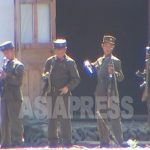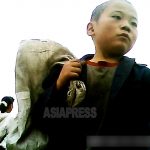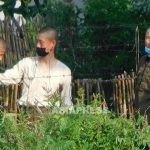◆Expectations in Pyongyang have dwindled
A mid-sized business owner in Pyongyang who returned from China in early July agreed to an interview with a member of ASIAPRESS on the condition of anonymity.
-- I heard Kim Jong-un's popularity has significantly increased after the talks with South Korea, China, and the U.S.
"Even though the Rodong Sinmun is praising Kim Jong-un for making possible the summits with South Korea and the Great Powers, I think the air of excitement has diminished. Life is still tough and nothing is changing. Those who understand the ways of the world are saying that it (summit diplomacy) was an act of submission and surrender resulting from economic difficulties. Most people in Pyongyang know that they are under economic sanctions because of nuclear development. Some say Kim Jong-un is just a greenhorn.
We are repeatedly told at workplace assemblies or lectures for residents that ‘We should not get caught up in fantasies even if our relationship with China has improved. This does not mean that the U.S. and South Korea are no longer our enemies. We must remain vigilant.”
-- Have the sanctions worsened Pyongyang's economy?
"You could say that incomes have halved. Business has been bad because of the decreased circulation of money. Goods are not selling well in the markets. With lower demand for taxis, the number of passengers has decreased. An acquaintance of mine quit driving taxis.
-- What about food rations in Pyongyang?
"The situation differs in each factory and workplace. White rice is supplied every month to national trade institutions, munitions factories, security agents, and police officers. In other institutions or factories, white rice is only given to the head of the household while other family members receive mixed grains. For June, we received 10 days’ worth of rations. It was 3 days’ worth of white rice and 7 days’ worth of mixed grains. This is less than what was provided before.
※Pyongyang is the only area in North Korea where food rations are being maintained.
-- Is there a food shortage?
"No. We can buy food in the market. It’s the state that does not have money. The treatment of soldiers in the People's Army has gotten significantly worse and parents (with children in the military) are dissatisfied. People say that they will starve to death if they do not borrow money once every three months.
Next page: June exports to China fall by 92% compared to previous year...





![<PHOTO REPORT>Sino - N.Korea Border [PART1]Things Still Tense in Border River Area After Purge of Jang Song-taek](https://www.asiapress.org/rimjin-gang/wp-content/uploads/2018/07/20140610_r_asiapressNK03X45-150x150.jpg)



















